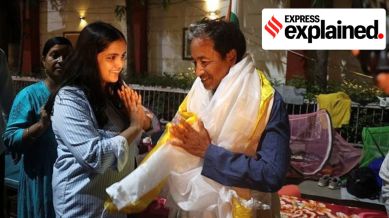Ladakh activist Sonam Wangchuk ends fast: What is Schedule 6 of the Indian Constitution?
Sonam Wangchuk and other activists from Ladakh have demanded that Schedule 6 be made applicable to the Union Territory. Here is what to know.

Ladakh-based activist Sonam Wangchuk ended his indefinite fast on Monday evening (October 21), after receiving a letter from the Union Ministry of Home Affairs on future talks about the Union Territory’s administration.
Wangchuk and other activists began marching from Ladakh to Delhi in September to discuss demands for greater autonomy in Ladakh’s administration with the Central government. Specifically, they wanted Schedule 6 of the Indian Constitution to be made applicable to Ladakh. Here is a brief recall of their demands and the larger issues.
Why were activists from Ladakh marching to Delhi?
Munda responded that his ministry was “seized of the matter” and had communicated a proposal to the MHA. However, there was no subsequent discussion on the subject with the leaders of Ladakh, Wangchuk said in 2023.
The demand also gained salience post the repeal of Article 370 of the Constitution in August 2019 and the subsequent enactment of the Jammu and Kashmir Reorganisation Act, 2019, with Ladakh getting recognised as a separate Union Territory.
Students-led protests for the demand in 2019 saw support from former MP Thupstan Chhewang, who then created the Leh Apex Body (ABL). Organisations in Kargil also came together to form the Kargil Democratic Alliance (KDA). These groups have been at the forefront of the protests. Wangchuk has been repeating that protections under the Sixth Schedule were an election promise that the BJP made in 2019, and the Government of India has to keep its word.
What’s the demand for the Sixth Schedule in Ladakh?
The Sixth Schedule under Article 244 of the Indian Constitution provides for the formation of tribal administrative regions called Autonomous District Councils (ADCs), as well as Autonomous Regional Councils (ARCs). A majority of the population in Ladakh belongs to Scheduled Tribes.
ADCs have up to 30 members with a term of five years and can make laws, rules and regulations on land, forest, water, agriculture, village councils, health, sanitation, village- and town-level policing, etc. Currently, there are 10 ADCs in the Northeast, with three each in Assam, Meghalaya and Mizoram, and one in Tripura. For more on the Schedule, read our explainer from March 2024 here.
Wangchuk said the people of Ladakh have demanded the decentralisation of power as they believe that “lower levels of bureaucracy” may have been “influenced by industrial powers and business houses”, who wanted “mining to take place in every valley here”.
What are the other reasons for the protest?
Talks between the Union Ministry of Home Affairs, the ABL and KDA reached an impasse in March this year. At the meeting, Union Home Minister Amit Shah offered to extend Article 371-like protections to the region. Shah is learnt to have said the concerns related to jobs, land, and culture would be taken care of, but the government would not go as far as to include Ladakh in the Sixth Schedule.
Wangchuk and others then began a fast in Leh, where he survived only on water and salt and slept outdoors in below-freezing-point temperatures for 21 days.
Subsequently, a planned ‘Pashmina march’ to the China border was cancelled, with Wangchuk claiming the administration told them Section 144 of the IPC would be imposed. According to Wangchuk, shepherds who have traditionally reared the famed pashmina goats for their highly sought-after wool faced problems. He said the loss of land to corporations (he did not name any) for setting up large industrial units or solar plants; and two, the activities of the Chinese along the Line of Actual Control (LAC) had impacted them.
He also flagged issues related to unemployment in the region post-2019.
What happens now?
The latest ‘Delhi Chalo Padyatra’ was organised by the ALB, with a four-point agenda for the support of Ladakh’s statehood, extension of the Sixth Schedule, early recruitment process along with a public service commission for Ladakh and separate Lok Sabha seats for Leh and Kargil districts.
Prashant Lokhande, the Joint Secretary of Jammu and Kashmir and Ladakh, met the activists at Ladakh Bhavan in New Delhi and handed them the letter from the ministry on Monday. It said the high-powered committee that previously held talks with Ladakh’s representatives will meet them on December 3.